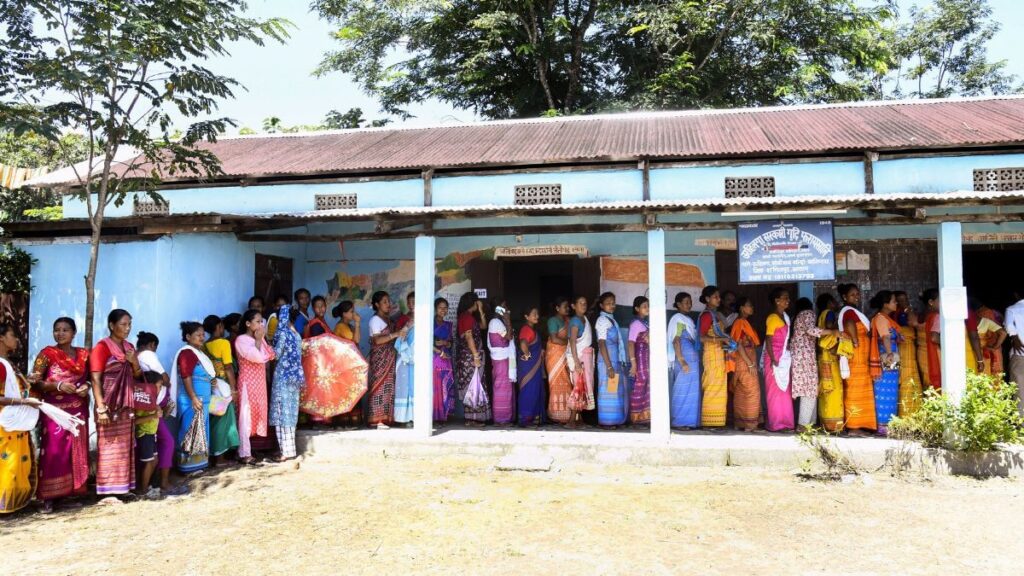New Delhi: The Bodoland People’s Front (BPF) has secured a landslide victory in the Bodoland Territorial Council (BTC) elections, winning 28 of the 40 seats and unseating the United People’s Party Liberal (UPPL) and the BJP, which had jointly governed the outgoing council.
The UPPL won seven seats and the BJP five, a significant drop from the 12 and nine seats they secured, respectively, in the 2020 BTC polls. The BPF had won 17 seats then, but the BJP and UPPL had formed a post-poll alliance to oust the BPF from power for the first time since the council’s formation in 2003.
The results mark a setback for the ruling BJP in Assam, which contested in 30 seats in the polls—billed as a semi-final ahead of the 2026 assembly election—after snapping its alliance with the UPPL.
Chief Minister Himanta Biswa Sarma had campaigned extensively across the five districts of Kokrajhar, Chirang, Baksa, Udalguri, and Tamulpur—which together form the Bodoland Territorial Region.
Of the 126 assembly constituencies in Assam, 16 fall in these districts.
This is the first time since 2016, when the BJP came to power in Assam, that the party’s tally has dipped in an election. By contesting solo, the BJP was aiming to emerge either as the single largest party or as a kingmaker in the council, keeping post-poll alliance options open with both the UPPL and BPF.
While the BPF has also been a BJP ally in the past, the alliance broke after the 2020 BTC polls, when the BJP dropped the party led by former armed insurgent Hagrama Mohilary and aligned with the UPPL to capture the council. In the 2021 Assam Assembly elections, the BPF allied with the Congress but began warming up to the BJP again after it returned to power.
The BTC is an autonomous council formed under the Sixth Schedule of the Constitution in 2003. It spans over 9,000 square kilometres and is predominantly inhabited by the Bodo people, along with other indigenous communities of Assam and a significant Muslim population.
The Bodo community is Assam’s largest tribal group, accounting for around 6 percent of the state’s population. The region witnessed decades-long armed insurgency and riots, driven by demands for a separate state. A series of peace accords, the most recent signed in 2020, ultimately brought an end to the armed movement.
The results also served as a grim reminder of the Congress’s ongoing struggle to revive its fortunes in a state it once dominated. Despite fielding candidates in all 40 council seats, the party failed to win even one. This was its first election since the appointment of Gaurav Gogoi as the Assam unit chief.
Admittedly, the Congress did not have a strong presence in the council even when the party was in power in Assam. For instance, it did not win any seat in BTC even in the 2015 or 2010 BTC polls. In 2020, it won just one seat.
Sources close to BPF chief Hagrama Mohilary told ThePrint that he is unlikely to project the results as an anti-BJP mandate, keeping in mind the need to maintain access to government funds. The BJP, for its part, is also expected to make efforts to keep Mohilary on its side ahead of next year’s elections.
Ahead of the counting day, Sarma had hinted that the BJP was prepared for a setback, saying the party’s campaign was affected by the efforts that went into organising the last rites of singer Zubeen Garg, who died in Singapore on 19 September, plunging Assam into deep mourning.
“The BTC poll results are politically very significant for the BJP, but we sacrificed it due to the unfortunate death of Garg and the consequent preparations to bid him farewell. This was a real setback for us in the BTC polls.The BJP’s result may not be as expected by us, but it will definitely be better than last time,” he told reporters on 25 September.
(Edited by Viny Mishra)
Also read: Beef, borders & bigotry—BJP Assam’s ‘infiltrator’ politics is back, now in AI wrapping

